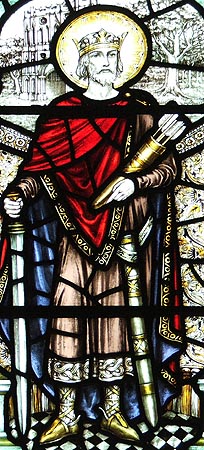Sunday, 30 March 2014
On Munds, Part One
Posted by
Supertradmum
The tradition of dowry has changed and in been in flux for centuries. The exchanging of swords became a sign of trust between a past enemy and the new friend. In the Icelandic annals, a new sword became a symbol of this old one of trust. The new sword could have been purchased by the new husband who would give it to his new wife. He could have been returning her father's sword, given to him, or he and she would have exchange swords.
By the time these customs were written down, the original customs had faded.
Why I am writing about this is that this type of thing is called a mund. The mund was a security for the woman, who was given land for her own posterity, so in case the man died, the widow would have something to live on. The mund is found in Beowulf, where it is called a "spear dowry", which would have been a cache of weapons. Weapons had a stable value. One could always sell these off, if needed. Would not a widow keep the weapons and pass these on to her son. The sons inherited stuff from the father, but so did the woman, for her upkeep and security.
The woman would not have to rely on brothers or uncles, which was a good thing. My saint, Etheldreda, had her own land ownership. As one betrothed, she had that security.specifically the male dowry. It's a Scandinavian concept, one made a promise of land, and if one broke the engagement or popped off that becomes the property of the woman betrothed and her family
The betrothal ceremony was extremely important, and legally binding. Christianity became controversial in some cultures, as it changed the emphasis from the engagement to the marriage. But, in England and in Germany, both stayed important.
The mund of the woman was usually money and that of the man, land. See an example, below.
What a great idea. The word mund is found in many Anglo-Saxon names, such as Edmund, Osmund, Garmund, Sigmund and others which include mund.
Mund means guardian, which is the shield for the wife. This is the security for the wife.
Any prefix makes sense with mund. Edmund means goodly or cute guardian. Ed is short from Edel, which means princely, or great. Etheldreda is from the same root, Ed being the diminutive.
Sigmund means victorious guardian, implying mund gotten in war.
Osmund means godly guardian, like the wonderful wizard of....as Os was a pagan god of the Anglo-Saxons.
In the first episode of By the Sword Divided, one sees played out in the series the old Anglo-Saxon idea of mund in the betrothal of Anne Lacey and John Fletcher, wherein, the fathers set the terms: Sir Martin Lacey gives money and Austin Fletcher gives lots of land, ships, and stuff from the New World.
Unless there were invasions, civil war, or pigginess from such monarchs as Henry VIII, who stole many a woman's mund, a woman could expect to have her mund until she died.
(Notes from Edmund. To be continued...)

